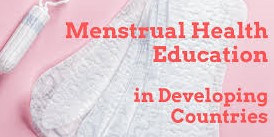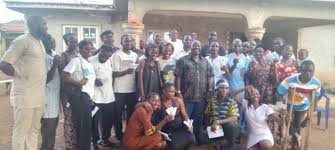Health
Menstrual Hygiene Solutions: Kaduna Girls Take Action

Menstrual hygiene solutions: Kaduna girls take action
Adolescent girls in Kaduna State, North-West Nigeria are currently behind the sale of over 15,000 packs of reusable menstrual hygiene products worth N3.5 million, in a scheme that has become not only a means of livelihood for communities, but has also improved quality of life for the users.
The difficulties girls go through to get sanitary pads can only be imagined, especially so in rural communities or slums.
One of such areas where this challenge manifests is Rigasa; is a densely populated urban slum in the south west of Igabi Local Government Area in Kaduna State.Mr Yusha’u Abubakar, Founder and Executive Director, Enhancing Communities Action for Peace and Better Health Initiative (E-CAPH), said the issue of sanitary pads was a challenge in the community because of poverty and lack of economic empowerment.
“When the United Nations Population Fund (UNFPA) called for an application for a project to support adolescent girls and boys, we decided to apply with focus on this area because it is a challenge.
“We sent our proposal and UNFPA found it worthy and supported us to train young girls in our community.”
He said 200 girls were trained on making reusable sanitary pads, adding that the initiative has improved school attendance of girls in the community as well as taken care of their menstruation hygiene challenges.
Impact of the training on the girls
Fatima Abdullahi, 18, is one those trained by E- CAPH and described the experience as overwhelming because she now produces it for her personal use and for trade.
“I was used to begging for money to buy pads or forced to use other materials in spite of its discomfort for my period. Now I help myself and others with my trade,” she said.
Similarly, Asma’u Mohammed, 18, said she was happy for the acquired skill that has made her self-reliant.
“With this, I don’t have to ask my parents for everything I need, because I can now earn little money by making sanitary pads for my peers.”
Sanitary pad boosting economic empowerment of the community
Albabatu Musa, Manager and Coordinator, E-CAPH Skills Acquisition Centre, said the accessibility of the reusable pad has made it a preferred choice for most girls in the Rigasa community.
“The reusable pad is made up of cotton-based materials because of its absorbable nature and easy access in the market.
“So far, 15,000 packs of three pieces each, have been produced at the centre and sold for N3.5 million to a client in Borno State.
“At the open market, a pack is sold for N500 and for every pack, there is a gain (profit) of N150. The product is in high demand,” she said.
Musa said the pad was highly profitable and cost effective because it can be used for a minimum of 3 months and a maximum of 6 months.
“A pack of three go for N500 with a profit margin of N150. The trained adolescents were currently making the reusable pad for their personal use and sales.”
Support by the UNFPA in the Rigasa pad project
Ms Mariana Darboe, the Programme Coordinator and Head of Office, UNFPA Decentralised Office for Northern Nigeria, said the reusable sanitary pad project was part of the livelihood support training as a COVID-19 response to alleviate poverty in communities.
She said the project was supported by the funds Risk Communication and Community Engagement (RCCE) project under the UN Basket Fund support for COVID-19 response in Nigeria.
Darboe added that the RCCE initiative was to curb the risk and impact of gender-based violence and interconnecting sexual and reproductive health consequences.
A mother’s burden lifted
A mother of four, Sadiya Ibrahim, said the reusable sanitary pad had reduced her stress “because most times during their menstrual period I am helpless to help my four girls with the needed money to buy sanitary pads.
“Sometimes they feel uncomfortable saying that they are on their period, so they just use available pieces of clothes to help themselves.
“Whenever they use clothes, they spend most of their time in the room because it makes them uncomfortable.”
How we got the buy-in of the communities considering the religious and cultural challenges
In most communities in northern Nigeria, talking about reproductive health issues among women and young girls is considered a no-go area. E-CAPH executive director Abubakar said the initiative surmounted this major limitation and got the buy-in of the community through advocacy.
“We were able to make people understand what sexual and reproductive health issues are all about and the need for parents to talk to their children about sexual reproductive health issues.
“The religious and community leaders provided the platform for us to talk to young girls in Islamiyah schools, women groups gathered their children and invited us to talk to them.
“This strategy helped in increasing the acceptance of talking about the issues in communities where it is hitherto difficult to do so.”
How the girls monthly dilemma turns to joy
Some users of the sanitary pads narrated their experiences on how it changed their monthly dilemma to joy.
Kadijah Salis, 17: “I use pieces of clothes due to lack of money to buy a pad. Sometimes I am forced to stay at home to avoid embarrassment in school because most times the clothes leak and stain our uniforms.
“The reusable pad is the best thing that has happened to some of us from poor households.
Sadiya Aliyu, 18, said she only got to hear of the reusable pad recently, adding that it is “better because I can use it for six months and it is very comfortable. I only need two for a whole year”.
The way forward for menstruation hygiene in Rigasa
The Founder and Executive Director of E-CAPH said that the initiative was able to overcome the challenges of non-acceptance by the community that was religiously inclined not to discuss matter relating to women and especially women monthly menstrual cycle.
This, he said, was due to the various trainings personnel of his organisation went through.
From these training “we were able to understand the role of religious leaders, community leaders, women and youth groups in advocating for reproductive health and family planning.
“There was equally a book produced by NUHRI on religious (Islamic and Christian) perspectives to family planning.
“We used the book in partnership with religious leaders and women groups to advocate for the acceptance of the family planning and reproductive health issues in communities.
“We were able to help them understand more about sexual and reproductive health issues. This led to the acceptance by parents to talk to their children and wards about sexual reproductive health issues.
Abubakar said that with the achievement so far recorded in helping the girls to better manage their menstrual hygiene, development partners, state government and local government areas should support the initiative to increase access by the poor and vulnerable adolescent girls in urban and rural areas.(NAN)
Health
World Bank, Partners Record Progress Toward 1.5bn Healthcare Goal

The World Bank Group, global partners and countries on Saturday announced continued progress toward the goal of delivering affordable and quality health services to 1.5 billion people by 2030.
A statement by the World Bank Online Media Briefing Centre said 15 countries introduced National Health Compacts, outlining practical five-year reforms aimed to expand primary healthcare, improve affordability and support job-rich economic growth.
The statement said that since the goal was set in April 2024, the Bank and partners had supported countries to provide quality and affordable care to 375 million people.
It said work was underway with roughly 45 countries to scale proven primary care approaches that strengthen health outcomes while generating employment across health workforces, local supply chains and supporting industries.
“This progress comes as governments confront aging populations, rising chronic disease, and financial pressures.”
The statement said the 2025 Global Monitoring Report released at the Tokyo Universal Health Coverage (UHC) High-Level Forum showed that 4.6 billion people globally still lacked access to essential health services.
It said the report also revealed that 2.1 billion people faced financial hardship due to health expenses.
“These challenges underscored the need for long-term, coordinated reforms that help countries build more resilient and equitable health systems.”
World Bank Group President, Ajay Banga, is quoted in the statement as saying, “strong primary healthcare systems are central to both health protection and economic growth.
“Strong primary health systems do more than safeguard health, they support jobs and economic opportunity.
“Countries are stepping forward with clear priorities, and we are working alongside them to deliver practical solutions at scale.”
According to the statement, the 15 countries that introduced National Health Compacts at the forum in Tokyo are Bangladesh, Egypt, Ethiopia, Fiji, Indonesia, Mexico, Morocco, Nigeria, Philippines, Sierra Leone, Syria, Tajikistan, Uganda, Uzbekistan and Zambia.
The statement said the compacts, which were endorsed at the highest levels of government, outlined five-year, country-led reforms aimed at expanding the reach and quality of primary healthcare, improving financial protection and strengthening health workforces.
“They also align Health and Finance Ministries behind measurable targets, provide a roadmap for coordinated action and guide support from development partners across country-led priorities.”
It said key commitments by countries include mobilising new financing, growing and digitally enabling their health workforce, modernising health facilities, expanding insurance coverage, and digitising service delivery.
“For example, in terms of boosting regional manufacturing of health products and technologies, Nigeria will train 10,000 pharmaceutical and biotech professionals and establish Centres of Excellence.
“Nigeria will also provide tax incentives to expand local production of vaccines, medicines, diagnostic and health technologies, strengthen regulatory agencies through digital systems and global alignment.”
It said that to help countries advance their compacts and broader reforms, the World Bank Group, Gavi and the Global Fund announced aligned financing, including two billion dollars in co-financing with each institution.
The statement added that philanthropic partners working through the Global Financing Facility and the Health Systems Transformation and Resilience Fund aim to mobilise up to 410 million dollars for critical health areas.
It said Seed Global Health was working with compact countries to build capacity and provide support for assessment, planning and policy development, with a focus on advanced health workforce development.
The statement said Japan, the United Kingdom and other partners were also providing technical assistance.
“Japan, WHO and the World Bank jointly launched a Universal Health Coverage Knowledge Hub to support countries with practical evidence-based solutions and peer learning.”
It said the UHC High-Level Forum, co-hosted by the Japanese Government, the WHO, and the World Bank Group, brought together ministers of health and finance, business leaders, philanthropies, global health agencies and civil society.
Health
UN Commits to Strengthening Nigeria’s Policy Framework, Enhancing Digital Safety

The UN Women has reaffirmed its commitment to strengthening policy frameworks, enhancing digital safety, and promoting accountability for online harms in Nigeria.
Deputy Executive Director for Normative Support, UNWomen, Nyara Gumbonzvanda, said this at a press conference on Saturday in Abuja.
The press conference was on Gumbonzvanda’s high-level mission to Nigeria and commemoration of the 2025 16 Days of Activism Against Gender-Based Violence (GBV).
She said that the visit was to deepen partnerships, reinforce national leadership, and accelerate collective action to advance gender equality and the empowerment of women and girls in Nigeria.
“A critical area of concern remains technology-facilitated GBV, which is rising globally and nationally.
“Between 16 per cent and 58 per cent of women worldwide experience some form of online or technology-facilitated GBV, depending on the region.
“UN Women is supporting the government and stakeholders in strengthening policy frameworks, enhancing digital safety, and promoting accountability for online harms,” she said.
She commended the National Assembly’s commitment to strengthening legislation that protects women and girls and advance women’s participation in governance, and called for effective legal frameworks and inclusive governance.
Gumbonzvanda decried low representation of women at the National Assembly, which she said stood at only 3.8 per cent, far below the global average of 27.2 per cent.
She, therefore, emphasised the need for legislative reforms such as affirmative action, quotas, and the proposed special seats bill, which she described as globally recognised tools to accelerate women’s participation.
”This is critical because globally, nearly one in three women experiences physical or sexual violence in their lifetime.
”Effective legal frameworks and inclusive governance are essential to reversing this trend,” she said.
On insecurity in Nigeria, she called for the release of abducted girls and reaffirm the need to ensure that every girl has the right to security and education.
She listed the impact of UN Women’s work in communities, including the commissioning of new WASH facilities.
She said that there was also rehabilitation of agro-processing centre in Kwali to improve women’s safety, reduce time burdens, and expand income-generating opportunities.
”UN Wornen will continue to mobilise partnerships across government, development partners, and the private sector to ensure that frontline organisations and national institutions have the resources required to deliver lasting change,” she said.
On her part, Beatrice Eyong, UN Country Representative to Nigeria and ECOWAS, commended the media for amplifying issues affecting women and girls in the country.
Health
APHPN President Seeks Enhancement of Public Health Delivery

From Mike Tayese, Yenagoa
The Association of Public Health Physicians of Nigeria (APHPN), has ascribed the current wave of movement of medical workers in the country abroad to insecurity and desire for better Welfare packages.
The National President of APHPN) Dr.
Terfa Kene, while speaking during his three day visit to Bayelsa State to seek support to enhance public health delivery in the state, urged other medical workers who are still in Nigeria to work for the improvement of public health in the country.Dr. Kene, also stated that once salaries of the health workers are improved and insecurity issues tackled, the challenge of migration of medical personnel would stop, adding that his mission to Bayelsa State is to ensure proper implementation of Primary Health Centre adoption.
He said: “There are factors responsible for people who are japa from the county. One of the factors is where they want to go, the health system is well advanced and people want to go and practice there and we may not have control over those interests.
“If the issue of insecurity is addressed, people will not want to run away from their locations. If the salaries of health officials are improved, then we would also know that you have that intended capacity. It’s not just addressing one component, there are several others that the government needs to work on and address, once they are addressed, the issue of migration will be reversed.
“Yes there is japa, but then it’s not everybody that is leaving the country, so those that are here, we should make our contribution as public health physicians.”
Dr. Kene, who also supervised the Medical Outreach for the people of Agbere community in Sagbama local government organised by APHPN, and visited some health agencies in the state, Bayelsa Health Insurance Scheme (BHIS), and the State Coordinator of World Health Organization, said the government need both the infrastructure, human personnel and medications to ensure well-being of the people.
He said: “When we are talking about the development agency of the government, we are talking about PHC, we are talking about health insurance, we are talking about the ministry of health, we are talking about other organs of government that have to do with public health.
“The important thing is that we build relationships with the local Communities by making an impact in contributing to public health in the entire Nigeria not just only Bayelsa state, that is why we organized medical outreach in the Agbere community. We are covering both the primary Healthcare center and cottage hospital nearby.” He said.
Also Speaking, the Chairman of APHPN in Bayelsa State, Dr. Enebipamo Amba-Ambaiowei, said a s public health physicians, they have a duty to provide healthcare, engage and make impact amongst members of the Communities.
He said why they carry out the medical outreach is to help the rural dwellers improve their healthcare and lives generally, adding that over hundred people were attended to during the outreach.
A beneficiary, Akali Anthony, said he had challenges of malaria and diabetes, but after medical screening he was administered with drugs, which saved him the high cost of affording them.
































